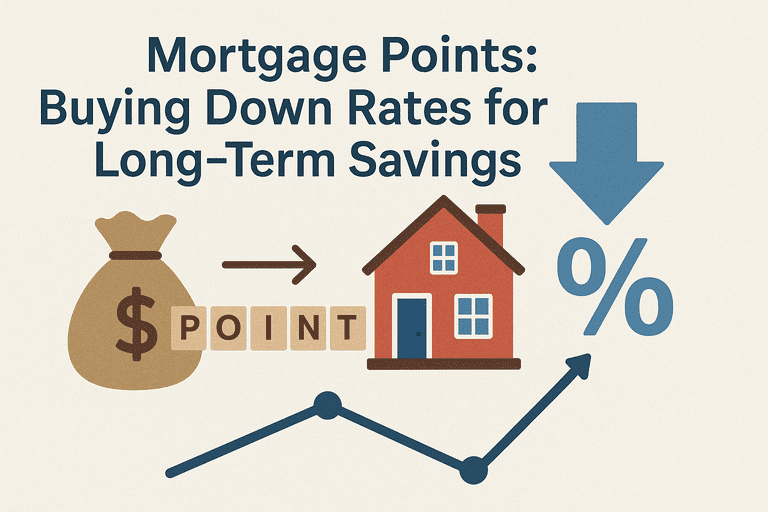When securing a mortgage, borrowers often focus on interest rates, monthly payments, and loan terms. However, mortgage points—also known as discount points—can provide significant long-term savings by lowering your interest rate. Understanding how to buy down rate strategically is essential for financially savvy homebuyers.
What Are Mortgage Points?
Mortgage points are upfront fees paid to the lender at closing to reduce your loan’s interest rate. Each point typically costs 1% of the total loan amount and can lower your interest rate by about 0.25% per point, though the exact reduction varies by lender and market conditions.
Key Concepts:
Discount Points: Prepaid interest used to lower your mortgage rate.
Origination Points: Fees charged by lenders for processing the loan (not used to reduce interest).
Buy Down Rate: The act of paying points to secure a lower interest rate over the life of the loan.
By purchasing points, borrowers may save thousands over the life of a mortgage, especially on long-term loans.
How Mortgage Points Affect Your Loan
Paying for points increases your upfront closing costs but can lower your monthly payment and total interest paid. This strategy is often beneficial for:
Long-Term Homeowners: The longer you stay in your home, the more you benefit from lower payments.
High-Balance Loans: Larger loans magnify the savings from reduced rates.
Stable Financial Situations: Borrowers who can afford higher closing costs upfront can maximize long-term benefits.
Example:
For a $300,000 mortgage:
Paying 2 points ($6,000) might reduce the interest rate from 6% to 5.5%.
Monthly savings: ~$80 per month
Break-even point: ~$6,000 ÷ $80 ≈ 75 months (6+ years)
This shows that mortgage points are most advantageous for those planning to stay in their home beyond the break-even period.
Types of Buy Down Strategies
Permanent Buy Down
Reduces interest rate for the entire life of the loan.
Usually requires upfront payment of points.
Best for long-term savings and consistent monthly payment reduction.
Temporary Buy Down
Lowers interest rate for a fixed initial period (e.g., first 1–3 years).
Often referred to as a “2-1 buy down,” where the rate is reduced by 2% in the first year and 1% in the second year.
Helpful for easing into mortgage payments for new homeowners.
Benefits of Paying Mortgage Points
Lower Monthly Payments: Reduced interest rates decrease your monthly mortgage cost.
Interest Savings Over Time: Significant reduction in total interest paid, especially with long-term fixed-rate loans.
Tax Deductions: Discount points may be deductible as mortgage interest on your federal taxes (consult a tax professional).
Better Budgeting: Fixed lower payments make long-term financial planning easier.
Considerations Before Buying Points
Break-Even Analysis: Calculate how long it takes to recover upfront costs through monthly savings.
Loan Term: Shorter-term loans may not justify points, while 30-year loans often do.
Market Conditions: If rates are already low, buying points may offer minimal savings.
Financial Flexibility: Ensure paying points doesn’t deplete your emergency funds.
Tips for Maximizing Mortgage Point Savings
Compare multiple lenders for points pricing and rate reductions.
Use mortgage calculators to simulate savings across different scenarios.
Combine points with other rate reduction strategies like improving credit score.
Consider future plans—if you plan to sell or refinance in a few years, paying points may not be worthwhile.
By carefully analyzing costs and benefits, borrowers can use mortgage points to achieve meaningful savings and financial predictability.
Conclusion: Strategic Use of Mortgage Points
Mortgage points and discount points are powerful tools for lowering your interest rate and monthly payments when used strategically. Whether through a permanent buy down or a temporary buy down, understanding how to buy down rate can significantly reduce long-term mortgage costs. By evaluating your financial goals, loan term, and market conditions, you can make informed decisions that maximize your home investment.
For tools, rate calculators, and expert guidance, visit CalculatingAMortgageLoan.com.
Sources:
